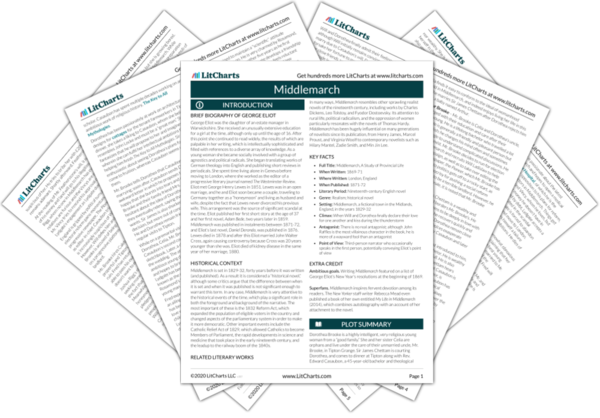Rail transport was still fairly new to England during the period in which the novel is set, which is just before the “railway boom” of the 1840s. As a result, the railway is yet another way in which the novel explores the tension between progress and resistance to change. When local people hear about plans for a railway that will cut through patches of land in Middlemarch, there is widespread fury and hysteria. Landowners and tenants alike are resistant to the idea of the land being cut up, whereas the local women adamantly oppose the railway on the grounds that traveling by rail is “presumptuous” and dangerous. These fears show that much opposition to the railway is essentially baseless. As Caleb points out after a group of anti-railway farmers attack him and his assistant with hay forks, the local people have been fed misinformation about the railway in order to ramp up opposition to it. At the same time, some of the reasons that the Middlemarchers give for opposing the railway are more valid than the reasons that they oppose other forms of technological progress (such as the New Hospital). One farm worker points out that the railway will only benefit rich people, which is a legitimate and prescient concern. Working-class men like him are disenfranchised and have no way to express their opposition to the railway other than through violence (hence the attack on Caleb and his assistant). The avalanche of industrial technology and the railway boom may not benefit them, but they are powerless to stop it.
Railway Quotes in Middlemarch
Book 6, Chapter 56 Quotes
In the hundred to which Middlemarch belonged railways were as exciting a topic as the Reform Bill or the imminent horrors of Cholera, and those who held the most decided views on the subject were women and landholders. Women both old and young regarded travelling by steam as presumptuous and dangerous, and argued against it by saying that nothing should induce them to get into a railway carriage.










